-
Hi Guest!
The costs of running this forum are covered by Sea Lion Press. If you'd like to help support the company and the forum, visit patreon.com/sealionpress
You are using an out of date browser. It may not display this or other websites correctly.
You should upgrade or use an alternative browser.
You should upgrade or use an alternative browser.
Breaking the Mould Redux: A Wikibox Timeline
- Thread starter Lucon50
- Start date
Coinciding with the New Ireland Forum's report came another round of UK local elections. These applied to English and Scottish districts, as well as metropolitan borough councils. Polls showed favourable opinion towards the Alliance's compromise of the miners' dispute from 1983 Conservative voters, although sections of the hard right preferred an even tougher line with the closure of dozens of unprofitable collieries, no state investment and privatisation. On the Labour side, fractures emerged at the leadership level. Tony Benn continued to vigorously defend Arthur Scargill and the NUM against attacks from the tabloid press and from anti-militant union activists. His deputy Neil Kinnock began to follow a different path. He warned the party to discard its agenda of nationalisation, class warfare and opposition to Europe, in favour of economic growth and modern communications. Benn strongly rejected Kinnock's premise. Labour could reach new voters, working- and middle-class, on a platform of democratic socialism articulated effectively. What he did not accept was a movement sabotaged by the influence of treacherous MPs. Benn told reporters his next stage was the "attraction of people back to a united Labour" in order to divide the right. He maintained he had few differences with the centrist wing. "My view is that the Labour Party should adhere to and put forward the policies it agreed at its conference, that's all." On the whole, Benn and Kinnock sympathisers found themselves on the same side when it came to the NUM. The deputy leader, MP for a mining community, pitched the "case for coal" as a noble fight. However, he personally detested Scargill for leading union members to the top of the hill, only to walk down again without a 'yes' vote for industrial action. As a consequence, the Government came away bruised but victorious in having averted a brutal strike. The dispute rattled Labour, exacerbated divisions in the trade union movement along factional lines and defined the SDP in particular. Moderate workers unhappy with confrontational class politics edged towards Shirley Williams' party over 1984, as Benn put forward arguments for a left-wing turn at every opportunity, in town hall discussions and speeches around the country. Willie Whitelaw picked up a base of support among traditional Conservative voters for his unifying right-wing manifesto of 'law and order', sound finances and pro-business regulation. In the end, a good result for Labour did not go unnoticed by parts of the establishment.
Last edited:
Willie Whitelaw responded to his party's mediocre results in the 1984 local elections by confidently asserting to trusted advisors, gathered the following Monday in CCHQ, that he would need to shed Margaret Thatcher's toxic legacy in order for the Tories to recover and challenge the Government. Labour were riding high in the polls after a move further left; reactionaries from the Monday Club and Norman Tebbit's Conservative Workers' Group in Parliament surmised that a dart to the fringes could do the same for Toryism. One key difference remained: the New Right had been discredited by unpopular decisions and a much worse defeat (in terms of seats) than Michael Foot's in 1983, kicked into opposition as Britain's third largest electoral force. Whitelaw was determined to stamp his authority on rebels in the party, while many Conservative MPs supported his unity leadership. In a speech televised for the evening news, Mr Whitelaw blamed several central tenets of the 1979-83 project - monetarism, high unemployment, public sector under-funding, weak defences and ideological stubbornness - for the Tories' decline. He laid out a vision for "pragmatic" governance enabling the state to invest in the economy (from industries like housing construction and ship-building to North Sea oil) while keeping a firm hand on the national budget. Treasury spokesman Norman Fowler appeared with him to announce a formal reversal to Keynesian monetary policy. A Conservative administration would spend to get rewards back in taxation, redistributing wealth via social security and protecting cherished institutions through moderate reform. Right-wing hostility arrived thick and fast. Even Thatcher intervened in the drama - castigating "the wets" for desertion and blaming the Falklands loss, not economic policies, for the election disaster. Her justification was warmly received by Tebbit and co, but got short shrift from foreign affairs spokesman Michael Heseltine, who called this explanation "rubbish". He said that unless the party abandoned free market dogma there was "not any prospect" of it having "a ghost of a chance of winning". Pragmatic monetarists such as Nigel Lawson and Geoffrey Howe stayed on the front bench, alarmed by some of their colleagues' refusal to accept changed political realities and get behind the leader.
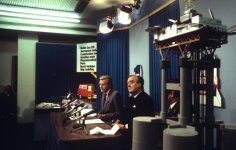
He strived to bring the Conservatives together on the issue of Northern Ireland. As a unionist party, they would oppose extensive power-sharing (for example, pooled sovereignty with Dublin). However, as Secretary of State in the 1970s he had pursued reconciliation through the establishment of a shared executive in Belfast comprising Catholics and Protestants. Mr Whitelaw, known for his charm and diplomatic skills, thought he could repeat the strategy when the Government's proposals came to light. Though he rejected joint Anglo-Irish control of the province, Heseltine was told to identify agreeable concessions, as the foundation of a peace plan. Under the Conservatives, Britain would give Ireland an advisory role in the North's governance while confirming that there would be no change in the constitutional position of Northern Ireland unless a majority of its citizens agreed to unite with the Republic. Heseltine also set out conditions for the formation of a devolved consensus administration in the region. The policy was a step too far for British loyalists on the right. Democratic Unionist leader and evangelical Ian Paisley addressed a crowd numbering over 100,000 in Belfast: "Where do the terrorists operate from? From the Irish Republic! That's where they come from! Where do the terrorists return to for sanctuary? To the Irish Republic! And yet Mr Steel, Mrs Williams and the Conservatives tell us that that Republic must have some say in our Province. We say never, never, never, never!" Whitelaw's middle-ground coalition began to fall apart at the seams. Across the aisle in the House of Commons, Tony Benn said he would order Labour MPs to vote against the Government's plan. "It is a fraudulent agreement which pretends to be all things to all people and will not work. A deal has been done to win the support of the US and the EEC to the partition of Ireland and the fact that this was thought to be necessary is an indication of the weakness of Britain's international position. It is time for us to renew the campaign for withdrawal. We are proposing the liberation of Ireland and Britain. We should get away from the bloodshed which has characterised our relationship and move to one of cooperation for the development of a decent society there and here. I'm absolutely certain that whatever the reaction of the media and the Establishment, before the end of this century we shall see that withdrawal take place."
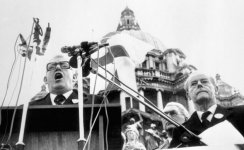
Seeking to bolster his agenda on the Troubles, the Prime Minister told interviewers that he would not accept bipartisanship with "thugs and criminals" from the IRA but welcomed cooperation with Dublin and various groups "from whichever quarter" in Northern Ireland on the "defeat of terrorism". He challenged nationalists to stand for election and take up seats to "argue their case" democratically in the UK Parliament. On the question of political status "there must be a unity of approach". Steel restated arguments that the EEC could provide a framework for joint sovereignty and partnership across the sectarian divides. "The progress of federalism must succeed where it once failed in Britain on the Home Rule debate in Mr Gladstone's time. Our Alliance hopes to replace the tragic disunity and separation of Éire with a lasting peace settlement." The Coalition hurried work on building an Anglo-Irish consultative body representing London, Dublin and Belfast. On the principle of cooperation, which had started bearing fruit in the areas of industrial policy and electoral reform, the Liberals and SDP aspired to bridge polarised viewpoints and communities. It was a tall order, testing the Alliance's basic philosophy on one of the UK's most difficult challenges. In Northern Ireland, British loyalists raised their banner in defiance of the prospective agreement with mass rallies. Paisley's DUP and the Ulster Unionists, led by Jim Molyneaux under the influence of Enoch Powell, organised a pact between them for future elections. Unionists held strikes and acted out civil disobedience in the province. 400,000 members of the public signed a petition against the treaty. Worse was yet to come, but the seeds of resolution and backlash had each been planted and the impact on Britain's political order could scarcely have been envisaged by law-makers at Westminster in those heady days of 1984.
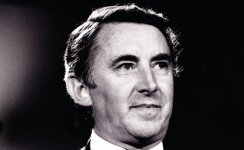

He strived to bring the Conservatives together on the issue of Northern Ireland. As a unionist party, they would oppose extensive power-sharing (for example, pooled sovereignty with Dublin). However, as Secretary of State in the 1970s he had pursued reconciliation through the establishment of a shared executive in Belfast comprising Catholics and Protestants. Mr Whitelaw, known for his charm and diplomatic skills, thought he could repeat the strategy when the Government's proposals came to light. Though he rejected joint Anglo-Irish control of the province, Heseltine was told to identify agreeable concessions, as the foundation of a peace plan. Under the Conservatives, Britain would give Ireland an advisory role in the North's governance while confirming that there would be no change in the constitutional position of Northern Ireland unless a majority of its citizens agreed to unite with the Republic. Heseltine also set out conditions for the formation of a devolved consensus administration in the region. The policy was a step too far for British loyalists on the right. Democratic Unionist leader and evangelical Ian Paisley addressed a crowd numbering over 100,000 in Belfast: "Where do the terrorists operate from? From the Irish Republic! That's where they come from! Where do the terrorists return to for sanctuary? To the Irish Republic! And yet Mr Steel, Mrs Williams and the Conservatives tell us that that Republic must have some say in our Province. We say never, never, never, never!" Whitelaw's middle-ground coalition began to fall apart at the seams. Across the aisle in the House of Commons, Tony Benn said he would order Labour MPs to vote against the Government's plan. "It is a fraudulent agreement which pretends to be all things to all people and will not work. A deal has been done to win the support of the US and the EEC to the partition of Ireland and the fact that this was thought to be necessary is an indication of the weakness of Britain's international position. It is time for us to renew the campaign for withdrawal. We are proposing the liberation of Ireland and Britain. We should get away from the bloodshed which has characterised our relationship and move to one of cooperation for the development of a decent society there and here. I'm absolutely certain that whatever the reaction of the media and the Establishment, before the end of this century we shall see that withdrawal take place."

Seeking to bolster his agenda on the Troubles, the Prime Minister told interviewers that he would not accept bipartisanship with "thugs and criminals" from the IRA but welcomed cooperation with Dublin and various groups "from whichever quarter" in Northern Ireland on the "defeat of terrorism". He challenged nationalists to stand for election and take up seats to "argue their case" democratically in the UK Parliament. On the question of political status "there must be a unity of approach". Steel restated arguments that the EEC could provide a framework for joint sovereignty and partnership across the sectarian divides. "The progress of federalism must succeed where it once failed in Britain on the Home Rule debate in Mr Gladstone's time. Our Alliance hopes to replace the tragic disunity and separation of Éire with a lasting peace settlement." The Coalition hurried work on building an Anglo-Irish consultative body representing London, Dublin and Belfast. On the principle of cooperation, which had started bearing fruit in the areas of industrial policy and electoral reform, the Liberals and SDP aspired to bridge polarised viewpoints and communities. It was a tall order, testing the Alliance's basic philosophy on one of the UK's most difficult challenges. In Northern Ireland, British loyalists raised their banner in defiance of the prospective agreement with mass rallies. Paisley's DUP and the Ulster Unionists, led by Jim Molyneaux under the influence of Enoch Powell, organised a pact between them for future elections. Unionists held strikes and acted out civil disobedience in the province. 400,000 members of the public signed a petition against the treaty. Worse was yet to come, but the seeds of resolution and backlash had each been planted and the impact on Britain's political order could scarcely have been envisaged by law-makers at Westminster in those heady days of 1984.

Last edited:
Six landmark bills finished their passage on to the statute book by July: the Education and Training Act, upgrading skills for the next generation of children and workers in Britain; the Environment, Housing and Public Investment Act, to get jobs for the long-term unemployed across multiple sectors; the Trade Union Reform Act, legislating for compulsory balloting among other changes to the unions; the Social Security Act to uprate welfare benefits; the Industrial Democracy Act, introducing employee participation to most companies; and the Electoral Reform Act, replacing first-past-the-post with a single transferable vote system of proportional representation for general elections. MPs heard views from all sides of debate over the Devolution Bill, providing for a Scottish Parliament. The Government liaised with constitutional experts throughout reading stages of the Bill of Rights Act. Together, these laws would change the face of the United Kingdom. Electoral reform saw the cherished prize of radicals at last attained. Liberals and Social Democrats could now more freely execute their programme and enjoy a future in politics without fear of the voting system triggering a sudden decline or reviving the old two-party duopoly. A Gallup survey for The Daily Telegraph had Labour on 37%, the Alliance at 36% and the Conservatives, 25%. Liberal Cyril Smith pointed out to fellow Government ministers that by reducing unemployment and burnishing their progressive credentials via legislation, the Labour poll lead could indeed be wiped out. Reforms extended far and wide into the economic sphere. Private firms of large or medium size were now required to include workers in the detailed operation of business. Employment Secretary Richard Wainwright hailed the end of a "civil war between the two sides of industry" thanks to the Alliance's courage to implement "strategic and structural" reforms. He claimed that management and unions had failed to widen democracy. "We have ended the class war, not by nationalising, de-nationalising, re-nationalising. Not by pretending the problem doesn't exist or intimidating the unions. In British industry far too many feel they have no stake in success, no role to play, nothing to contribute. Our greatest need is to build a sense of belonging to one community. We are all in it together. With the Alliance, change has come."
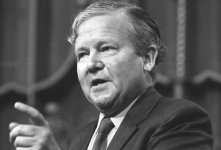
Implementation of the Plan for Coal got started over summer. The Prime Minister allowed his affable deputy Shirley Williams, with responsible SDP figures Ian Gilmour and John Smith, to take charge of realising a "fair transition" in lockstep with trade unionists and the NCB under Eric Varley. They would develop a framework encompassing a range of social interventions needed to secure workers' rights and livelihoods. Williams ruled out dividing communities or leaving regions and families stranded and impoverished. "We will invest as a matter of urgent priority in different types of energy and new technologies, especially the use of sources of energy like the sun, wind, waves and the heat below the earth's surface and the development of combined heat and power systems. We are determined to maintain a British power plant industry." She travelled to mining towns over August, finding applause and engagement from people in the East Midlands but a torrent of abuse during a visit to Yorkshire. The Alliance made certain to deliver new jobs in the place of old pits coming to the end of their economic life. While industrial relations experienced a marked improvement (in terms of workers and management), organised socialists and Tony Benn's Labour Party refused to give up the struggle for self-management and employee ownership in direct contrast to the interests of bosses. The Government succeeded to an extent at dividing the left, picking up support among conservative trade union members (for example, in the Electrical, Electronic, Telecommunications and Plumbing Union). Gradually, droves of independent swing voters cast the Tories aside for Steel and Williams' bright new crusade to 'modernise' the post-war consensus.
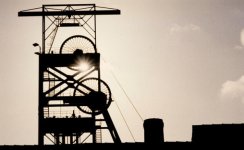

Implementation of the Plan for Coal got started over summer. The Prime Minister allowed his affable deputy Shirley Williams, with responsible SDP figures Ian Gilmour and John Smith, to take charge of realising a "fair transition" in lockstep with trade unionists and the NCB under Eric Varley. They would develop a framework encompassing a range of social interventions needed to secure workers' rights and livelihoods. Williams ruled out dividing communities or leaving regions and families stranded and impoverished. "We will invest as a matter of urgent priority in different types of energy and new technologies, especially the use of sources of energy like the sun, wind, waves and the heat below the earth's surface and the development of combined heat and power systems. We are determined to maintain a British power plant industry." She travelled to mining towns over August, finding applause and engagement from people in the East Midlands but a torrent of abuse during a visit to Yorkshire. The Alliance made certain to deliver new jobs in the place of old pits coming to the end of their economic life. While industrial relations experienced a marked improvement (in terms of workers and management), organised socialists and Tony Benn's Labour Party refused to give up the struggle for self-management and employee ownership in direct contrast to the interests of bosses. The Government succeeded to an extent at dividing the left, picking up support among conservative trade union members (for example, in the Electrical, Electronic, Telecommunications and Plumbing Union). Gradually, droves of independent swing voters cast the Tories aside for Steel and Williams' bright new crusade to 'modernise' the post-war consensus.

Last edited:
On 31 July 1984, MPs gathered in the House of Commons for the last session of Questions to the Prime Minister before heading into recess. Britain's economy had begun to turn a corner: unemployment fell from 13% of the workforce in 1982 to below 10%, while the inflation rate hovered around 5%, a sharp drop following the previous decade's dramatic oil crisis. The Government were investing in new technologies, energy resources, public services, households and firms. All of this is reflected in the polls and surveys of the mid-1980s, as civilians found greater support and opportunity to raise their standard of living. Tensions in the labour movement had reached a peak, although talks existed of right-wing members of the NUM preparing to break away from Arthur Scargill. With politicians of all stripes packed into the Commons chamber, David Steel listed his official engagements. "Mr Speaker, this morning I had meetings with ministerial colleagues and others. In addition to my duties in this House, I shall be having further meetings later today." Conservative MP Michael Mates accused the Prime Minister of having a shaky allegiance to "nuclear and conventional defence through NATO" in the light of anti-war statements by Labour. Mr Steel was emphatic. "The honourable member is quite mistaken! Britain's nuclear deterrent is a fundamental part of NATO defence. Of course, we strongly back multilateral disarmament and arms control efforts, in particular the Geneva negotiations for reduction in both sides' strategic (START) and the intermediate range (INF) nuclear weapons. The Labour Party have given the clearest distinction yet between a Government dedicated to peaceful security and an Opposition who would put our national defences at risk."
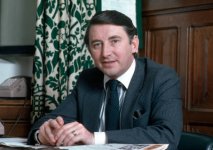
Commons speaker John Golding, an opponent of "idle dreamers" in Militant and the radical left, called Tony Benn to the despatch box. The Labour leader had been out supporting miners at NUM rallies until the vote was taken not to strike but accept the Government's investment deal. Hardened socialists such as himself regretted some of the changes but reserved their strongest words for the Conservative-aligned press, who'd set out on a campaign of demonisation. "I'd like to pay tribute to the NUM, to the communities, to the young miners, to the women support groups and to the leadership of the NUM, who have given to the people of this country hope for the future." Tory MPs heckled. Benn pressed on. "Mr Speaker, why is it that this coming winter, like every winter that's gone by, old people and poor people should die of hypothermia when there is coal to be dug that would keep them warm?" As he sat back down, the PM rose to reply. "I'm afraid that voters are utterly fed up by the right honourable gentleman's refusal to distance himself from Arthur Scargill. Instead of stubbornness, we have chosen a policy of compromise that will bring long-overdue reforms to the mining sector, while placing the rights of employees front and centre." Benn asked his next question. "The Prime Minister has termed a number of pits 'uneconomic'. If he wants a market for coal, will the Government provide free or subsidised electricity for every pensioner and everybody on social security, to give every miner work?" Steel referred to new legislation abolishing standing charges for gas, electricity and telephone services. "I'd be interested to find out exactly how he intends to pay for free fuel..." Benn could be heard mouthing "stop the nuclear power stations now!" defiantly from the benches opposite. Steel finished his remarks, drawing a political battle line. "The Labour programme would bankrupt Britain's economy, rendering their extreme spending plans totally undeliverable. We are making sure that workers get fair compensation and that no family lives in poverty, but to do that you need a healthy mixed economy, not Marxism."
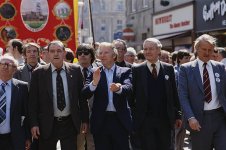
Mr Benn embarked on another tour over the hottest months, speaking at rallies and listening to people from all walks of life to debate and understand their concerns. Acting on a mandate granted by party members, he developed a critique of British capitalism for the next Labour manifesto. Britain needed a siege economy to protect domestic industry; nationalisation or selective share ownership of the top 25-100 companies and joint stock banks; wide-ranging constitutional reform; withdrawal from the Common Market, NATO and Ireland; and unilateral nuclear disarmament. The Bennite worldview presented a well worked out analysis according to which the IMF, the World Bank and multinational corporations ran the global economy. The European Commission and the establishment governed Britain. Spin doctors and pollsters dominated politics. "I did not enter the Labour Party... to have our manifesto written by Dr Mori, Dr Gallup and Mr Harris," wrote Benn. A biographer observed that the new Labour leader was "a socialist whose political commitment owes much more to the teaching of Jesus than the writing of Marx". In Parliament, the right made up a plurality of Labour MPs. Yet Mr Benn's popularity among the trade unions, grass-roots activists, left-wing social movements and young voters meant that he derived legitimacy from a wide section of the public and could not be ousted. Parliamentarians were also fearful of being de-selected from their seats by party members before the next general election. Therefore, only the most rabidly hostile elements spoke out against a socialist transformation of Labour and the rise of Militant. Centrists would need to wait for a moment of weakness for Benn in order to replace his leadership and steer the party back to moderation. Labour support increased rapidly in traditional heartlands dependent upon employment from factories with high unionisation, while the Alliance built their base first and foremost from a growing sub-class of middle earners.
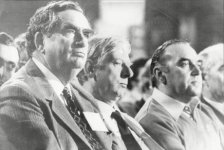

Commons speaker John Golding, an opponent of "idle dreamers" in Militant and the radical left, called Tony Benn to the despatch box. The Labour leader had been out supporting miners at NUM rallies until the vote was taken not to strike but accept the Government's investment deal. Hardened socialists such as himself regretted some of the changes but reserved their strongest words for the Conservative-aligned press, who'd set out on a campaign of demonisation. "I'd like to pay tribute to the NUM, to the communities, to the young miners, to the women support groups and to the leadership of the NUM, who have given to the people of this country hope for the future." Tory MPs heckled. Benn pressed on. "Mr Speaker, why is it that this coming winter, like every winter that's gone by, old people and poor people should die of hypothermia when there is coal to be dug that would keep them warm?" As he sat back down, the PM rose to reply. "I'm afraid that voters are utterly fed up by the right honourable gentleman's refusal to distance himself from Arthur Scargill. Instead of stubbornness, we have chosen a policy of compromise that will bring long-overdue reforms to the mining sector, while placing the rights of employees front and centre." Benn asked his next question. "The Prime Minister has termed a number of pits 'uneconomic'. If he wants a market for coal, will the Government provide free or subsidised electricity for every pensioner and everybody on social security, to give every miner work?" Steel referred to new legislation abolishing standing charges for gas, electricity and telephone services. "I'd be interested to find out exactly how he intends to pay for free fuel..." Benn could be heard mouthing "stop the nuclear power stations now!" defiantly from the benches opposite. Steel finished his remarks, drawing a political battle line. "The Labour programme would bankrupt Britain's economy, rendering their extreme spending plans totally undeliverable. We are making sure that workers get fair compensation and that no family lives in poverty, but to do that you need a healthy mixed economy, not Marxism."

Mr Benn embarked on another tour over the hottest months, speaking at rallies and listening to people from all walks of life to debate and understand their concerns. Acting on a mandate granted by party members, he developed a critique of British capitalism for the next Labour manifesto. Britain needed a siege economy to protect domestic industry; nationalisation or selective share ownership of the top 25-100 companies and joint stock banks; wide-ranging constitutional reform; withdrawal from the Common Market, NATO and Ireland; and unilateral nuclear disarmament. The Bennite worldview presented a well worked out analysis according to which the IMF, the World Bank and multinational corporations ran the global economy. The European Commission and the establishment governed Britain. Spin doctors and pollsters dominated politics. "I did not enter the Labour Party... to have our manifesto written by Dr Mori, Dr Gallup and Mr Harris," wrote Benn. A biographer observed that the new Labour leader was "a socialist whose political commitment owes much more to the teaching of Jesus than the writing of Marx". In Parliament, the right made up a plurality of Labour MPs. Yet Mr Benn's popularity among the trade unions, grass-roots activists, left-wing social movements and young voters meant that he derived legitimacy from a wide section of the public and could not be ousted. Parliamentarians were also fearful of being de-selected from their seats by party members before the next general election. Therefore, only the most rabidly hostile elements spoke out against a socialist transformation of Labour and the rise of Militant. Centrists would need to wait for a moment of weakness for Benn in order to replace his leadership and steer the party back to moderation. Labour support increased rapidly in traditional heartlands dependent upon employment from factories with high unionisation, while the Alliance built their base first and foremost from a growing sub-class of middle earners.

Last edited:
Corners of the press unleashed "a great outcry" in the words of Arthur Scargill against his scepticism of national ballots and call for extra-parliamentary action. Right-wing tabloids, led by The Sun and The Daily Mail, told readers that the NUM president had defied "the will of the people"; in return, he blasted critics for making efforts to destroy the coal industry and social services. Widespread public sympathy for the miners' struggle gave way to a majority in favour of the Government's response. As state revenues were ploughed into the creation of new jobs, calming the situation, the Tory press hit back. Features in The Sun utilised misleading and selective information to confirm their vehemently anti-trade union narrative. If working-class readers turned against Scargill, the Conservative Party itself boasted an army of well-known if somewhat discredited figures intent on portraying the miners as violent thugs. Home affairs spokesman Leon Brittan, a post-Thatcherite hardliner, said there was no place for "the dictatorial personal leadership" of Mr Scargill in the UK's industrial relations. Leading Conservative MPs tried to paint militant trade unionists defending the main source of employment in their communities as a dangerous threat to the rule of law. Tony Benn was accused of giving "succour" to the NUM. Disgraced ex-Tory chair Cecil Parkinson branded Scargill a "Luddite" standing in the way of free enterprise. Although the right wanted to go much further than the Government in closing pits, laying off thousands of jobs and privatising coal, ordinary people (especially in the south of England) drawn to Thatcher now rallied behind the Liberal/SDP Alliance for facing down the miners. Willie Whitelaw conferred with advisors on how to stem the loss of natural party voters. Despite his preference for diplomacy and agreement, Whitelaw gave his authorisation to Mr Brittan's increasingly sensational broadsides in the press.
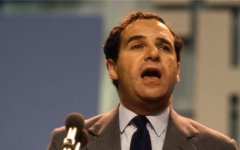
The leadership team agonised that summer over factional manoeuvring by Norman Tebbit, whose defeated attempt to prevent a Whitelaw or Heseltine ascendancy in 1983 had convinced him that excluded right-wingers simply did not have the strength of numbers in Parliament to win back leadership of their party. During an address to the CBI, Mr Whitelaw advanced his instinctive outlook: that ministers should collaborate with businesses and trade unions for "economic success". Britain, he said, required a "massive investment programme" financed by the public, new capacity and innovative machine tools to raise productivity. None of this was good enough for some monetarists on his isolated right flank. Anticipating a lukewarm reaction from the likes of Tebbit, Whitelaw went on to announce his support for a limited round of privatisation, to be included as Conservative policy. The Ridley report devised for Thatcher in the 1970s recommended breaking up the state sector and dismembering unions. She had prioritised wage suppression to control inflation between 1979-83; that Government did, however, manage to flog some companies, partially selling off British Aerospace, Britoil, British Petroleum and Cable & Wireless. On re-entering Downing Street, the Tories would fully de-nationalise these assets. The immediate windfalls could be spent on education, healthcare and crime prevention. Whitelaw's plan came under heavy fire from the usual suspects; then, Michael Heseltine and Nigel Lawson each took to the airwaves to support the proposals. Tebbit, sensing that Whitelaw had united the left and centre of the party but divided the New Right brought into the mainstream by Thatcher, lashed out. "Everywhere one looks, our competitors are embracing privatisation," he argued. "Mr Whitelaw is leading this party to disaster with his timid and failed socialist agenda." In words designed to raise the flag of 1979, Tebbit explained his radical alternative. "Popular capitalism is nothing less than a crusade to enfranchise the many in the economic life of the nation. We Conservatives must return power to the people."
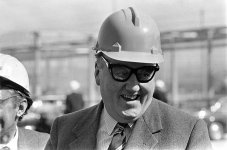
During August 1984, discipline among Tory MPs collapsed. Investment, ownership, the welfare state - on economic philosophy, splits emerged between friends and rivals from the same tribe holding very different views. Whitelaw refused to be drawn into "ideological debates" and cited Edmund Burke, placing his trust in "experience" and the "gradual improvement of tried and tested arrangements". With their leader having abandoned the field, so-called 'wets' on the left of the party openly attacked the most zealous 'dries' in scenes reminiscent of 1982. Furious, Tebbit said MPs should oust Mr Whitelaw and install a monetarist in his place. "We've got a better shadow cabinet on the backbenches than we have in the actual shadow cabinet on the frontbench," he quipped. Whitelaw dismissed the revolt. Heseltine claimed that Tebbit feared a Conservative victory because the leadership had sensible ideas to boost the economy. Other colleagues on the right, such as defence spokesman Robert Gascoyne-Cecil, lobbied Whitelaw to alter his position on Northern Ireland to minimal effect. Geoffrey Howe, along with Lawson and Brittan, publicly lambasted Tebbit. The Monday Club's chairman in June 1981, David Storey, had described it as "an anchor to a ship", keeping within its ranks many who contemplated defecting. Several MPs in the Conservative Workers' Group flirted with setting up a new organisation to put up candidates in seats at the next general election. Hard-right factions held a large national membership with MPs, Lords, branches and groups in universities and colleges. One event that surpassed these brutal developments and intrigued onlookers was the barely concealed meeting of Mr Tebbit with Enoch Powell at the latter's home in Belgravia, London to discuss the state of the union and the future of the Conservative Party.
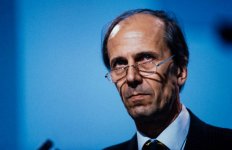

The leadership team agonised that summer over factional manoeuvring by Norman Tebbit, whose defeated attempt to prevent a Whitelaw or Heseltine ascendancy in 1983 had convinced him that excluded right-wingers simply did not have the strength of numbers in Parliament to win back leadership of their party. During an address to the CBI, Mr Whitelaw advanced his instinctive outlook: that ministers should collaborate with businesses and trade unions for "economic success". Britain, he said, required a "massive investment programme" financed by the public, new capacity and innovative machine tools to raise productivity. None of this was good enough for some monetarists on his isolated right flank. Anticipating a lukewarm reaction from the likes of Tebbit, Whitelaw went on to announce his support for a limited round of privatisation, to be included as Conservative policy. The Ridley report devised for Thatcher in the 1970s recommended breaking up the state sector and dismembering unions. She had prioritised wage suppression to control inflation between 1979-83; that Government did, however, manage to flog some companies, partially selling off British Aerospace, Britoil, British Petroleum and Cable & Wireless. On re-entering Downing Street, the Tories would fully de-nationalise these assets. The immediate windfalls could be spent on education, healthcare and crime prevention. Whitelaw's plan came under heavy fire from the usual suspects; then, Michael Heseltine and Nigel Lawson each took to the airwaves to support the proposals. Tebbit, sensing that Whitelaw had united the left and centre of the party but divided the New Right brought into the mainstream by Thatcher, lashed out. "Everywhere one looks, our competitors are embracing privatisation," he argued. "Mr Whitelaw is leading this party to disaster with his timid and failed socialist agenda." In words designed to raise the flag of 1979, Tebbit explained his radical alternative. "Popular capitalism is nothing less than a crusade to enfranchise the many in the economic life of the nation. We Conservatives must return power to the people."

During August 1984, discipline among Tory MPs collapsed. Investment, ownership, the welfare state - on economic philosophy, splits emerged between friends and rivals from the same tribe holding very different views. Whitelaw refused to be drawn into "ideological debates" and cited Edmund Burke, placing his trust in "experience" and the "gradual improvement of tried and tested arrangements". With their leader having abandoned the field, so-called 'wets' on the left of the party openly attacked the most zealous 'dries' in scenes reminiscent of 1982. Furious, Tebbit said MPs should oust Mr Whitelaw and install a monetarist in his place. "We've got a better shadow cabinet on the backbenches than we have in the actual shadow cabinet on the frontbench," he quipped. Whitelaw dismissed the revolt. Heseltine claimed that Tebbit feared a Conservative victory because the leadership had sensible ideas to boost the economy. Other colleagues on the right, such as defence spokesman Robert Gascoyne-Cecil, lobbied Whitelaw to alter his position on Northern Ireland to minimal effect. Geoffrey Howe, along with Lawson and Brittan, publicly lambasted Tebbit. The Monday Club's chairman in June 1981, David Storey, had described it as "an anchor to a ship", keeping within its ranks many who contemplated defecting. Several MPs in the Conservative Workers' Group flirted with setting up a new organisation to put up candidates in seats at the next general election. Hard-right factions held a large national membership with MPs, Lords, branches and groups in universities and colleges. One event that surpassed these brutal developments and intrigued onlookers was the barely concealed meeting of Mr Tebbit with Enoch Powell at the latter's home in Belgravia, London to discuss the state of the union and the future of the Conservative Party.

Last edited:
East-West relations were in a difficult situation by early 1984. In November 1983, the Soviet Union unilaterally walked out of the INF talks and in December of the same year, the START agenda got postponed indefinitely. In the first half of 1984, the USSR refused to respond to the call of the United States for an early resumption of the arms control negotiations, maintaining instead her condition that the removal of the American INF missiles deployed in Western Europe was a prerequisite for resuming dialogue. Around mid-year, US initiatives produced some progress with modernisation of the hotline between Washington and Moscow. While maintaining its drive to restore power and prestige, the US emphasised a policy of expediting progress in bilateral relations with the USSR as well as in arms control. In the face of steady deployment of INFs in Western Europe as scheduled and of demonstration of NATO solidarity such as shown at the London Summit in June, the Soviets were forced to modify their hard-line stance and seek new policies toward the West, taking this new situation into account. In the arms control field, the USSR, perhaps cautious of US preparedness for its Strategic Defense Initiative (SDI), began to place increasing emphasis on the issue of space weapons and proposed on 29 June that the two countries meet in Vienna in September to begin talks on preventing the militarisation of outer space. In response, America promptly expressed its readiness to discuss arrangements under which the INF and START process could be resumed and to discuss negotiating approaches which could lead to limitations on anti-satellite weapons. The British PM David Steel conducted shuttle diplomacy via telephone, pressuring the Reagan administration in Washington to accept a moratorium on space weapons development and testing, while persuading the Soviet foreign minister Andrei Gromyko to resume talks on INF and START.
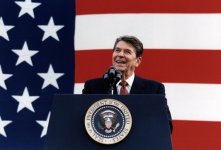
In a diplomatic coup for the UK, the September negotiations went ahead. President Reagan took a flexible stance and the USSR presented a friendly attitude, leading to the conference in Geneva. The objective of the negotiations would be to work out effective agreements aimed at preventing an arms race in space and terminating it on earth, limiting and reducing nuclear arms for greater stability. Talks were conducted in three groups (strategic nuclear arms, intermediate-range nuclear arms and space arms). Further to this, multiple countries engaged in discussions to reduce the threat of a mutually destructive war by lowering weapons stockpiles. The British position was clear to her allies but amounted to the product of complicated trade-offs between the governing coalition partners. Mr Steel, as head of the Liberal Party, was personally indifferent to the question of whether the UK should continue to possess a nuclear 'deterrent' system. A large proportion of active Liberal members at the grass roots, along with radical MPs, prided themselves on being committed disarmers. The SDP, however, contained many people in favour of replacing Polaris with an upgraded version, namely Trident. Having decided to include Polaris in the Geneva talks and ruled out the upgrade, David Owen joined Steel at the summit with a constructive strategy. Her closest NATO ally pushing for multilateral efforts, the delegation for America agreed to explore the cancellation of SDI (nicknamed 'Star Wars') in return for a list of Soviet concessions. The resulting treaty, signed in 1985 upon the accession of Mikhail Gorbachev, banned all nuclear and conventional ground-launched ballistic missiles, cruise missiles and missile launchers with ranges of 500-1,000 km (short medium-range) and 1,000-5,500 km (intermediate-range). The treaty did not apply to air-launched missiles. Day by day, Cold War tensions would unfreeze from there on.
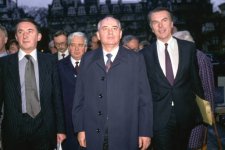

In a diplomatic coup for the UK, the September negotiations went ahead. President Reagan took a flexible stance and the USSR presented a friendly attitude, leading to the conference in Geneva. The objective of the negotiations would be to work out effective agreements aimed at preventing an arms race in space and terminating it on earth, limiting and reducing nuclear arms for greater stability. Talks were conducted in three groups (strategic nuclear arms, intermediate-range nuclear arms and space arms). Further to this, multiple countries engaged in discussions to reduce the threat of a mutually destructive war by lowering weapons stockpiles. The British position was clear to her allies but amounted to the product of complicated trade-offs between the governing coalition partners. Mr Steel, as head of the Liberal Party, was personally indifferent to the question of whether the UK should continue to possess a nuclear 'deterrent' system. A large proportion of active Liberal members at the grass roots, along with radical MPs, prided themselves on being committed disarmers. The SDP, however, contained many people in favour of replacing Polaris with an upgraded version, namely Trident. Having decided to include Polaris in the Geneva talks and ruled out the upgrade, David Owen joined Steel at the summit with a constructive strategy. Her closest NATO ally pushing for multilateral efforts, the delegation for America agreed to explore the cancellation of SDI (nicknamed 'Star Wars') in return for a list of Soviet concessions. The resulting treaty, signed in 1985 upon the accession of Mikhail Gorbachev, banned all nuclear and conventional ground-launched ballistic missiles, cruise missiles and missile launchers with ranges of 500-1,000 km (short medium-range) and 1,000-5,500 km (intermediate-range). The treaty did not apply to air-launched missiles. Day by day, Cold War tensions would unfreeze from there on.

Last edited:
Delegates arrived along the south coast for the 1984 Conservative Party conference on 8 October. A packed out hall in the Brighton Hotel played host to fringe events, panels of major Tory figures and, on Friday, the leader's speech. Though the IRA signalled a willingness to be more active on the UK mainland, security for the gathering was rather lax. Many older party members voiced support for the Whitelaw leadership and condemnation of Norman Tebbit as civil war had been raging in Parliament. Chief whip David Waddington, a loyal rightist, reached out to colleagues on the backbenches in a bid to mollify them over policy and strategic concerns. Evening of 11 October saw the conference representatives mingle at a lively drinks reception. Political players moved around the room, testing unpredictable weather. After an hour of socialising with guests, Mr Whitelaw retired to the Grand Hotel in order to practise his words for the next day. Hiking up to the podium in front of a blue backdrop and the sea of party faithful, the ageing war horse concealed a nervous anxiety. The audience applauded. His frontbench team, never short of ambition for the spokesmen of a party holding just 108 MPs, congratulated each other at the front row. Stars of the reactionary Monday Club and unrepentant monetarists in the Conservative Workers' Group perched like vultures from across the hall. Whitelaw thanked dear friends and began the speech, championing the virtues of his own "experience" over the years and party "loyalty" wedded to a sense of public duty. Much as he'd worked with Norman Fowler to tilt Tory opinion away from laissez-faire economics, Mr Whitelaw now attempted to compensate and bring the party together after the divisive Thatcher years. "We did have considerable success in cutting down inflation. Now don't let's deny that, of course, there's a great worry with unemployment." The leader was careful to suggest in his remarks that his project was not a pale imitation of the Alliance's and called the lingering distinction between wets and dries absurd. "What I do know is that I have views, naturally, about the priorities from our law-and-order stance; very strong views about creating jobs in the north, where I come from."
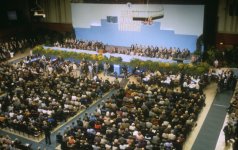
Whitelaw attacked previous governments for spending beyond the nation's means to earn revenue. This cheered some monetarists within his team. His party would make British firms globally competitive and improve economic growth. "That is why we had to make a change," he argued, embracing the record of a polarising, rather experimental administration in which he served as Deputy Prime Minister and Home Secretary. "You could always buy cheap popularity in politics; but what matters is, will it be right for the party? Much more important, will it be right for the country? In two or three years' time? Will we have done what is right for Britain? That's what matters." Nigel Lawson led a standing ovation, joined principally by Geoffrey Howe and Leon Brittan. Support from these men boosted Whitelaw's legitimacy by pulling other fiscal conservatives into the fold. His next segment intimated the unhappiness many had shared when unemployment, poverty and decline mushroomed out of control during their last spell in office. As Tories, every member needed to provide society with "the right way", instead of "easy answers". Reaffirming the concept behind his unity pitch for the leadership of "steadying the boat", Mr Whitelaw invited people from all sections of the party to design a compromise position on the economy, as well as other issues. Few proposed positions found favour from the militant wing. Conservatives on the front bench were making "excellent" progress, submitting ideas to: "unite the nation" with public and private investment; reconstruct industry using modern business practices; "support the most needy and vulnerable" using adequate welfare; reinvigorate the Keynesian promise by sticking to healthy finances with subsidies here and there; welcome immigration from the Commonwealth; promote European integration; and foster "peace and reconciliation in Ulster" by accepting the possibility of Irish reunification.
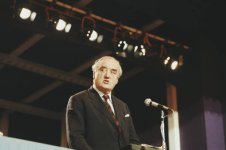
Here, the speech fell apart. Dozens of CWG and Monday Club figures, on hearing the leader's words, stormed out in protest. Whitelaw had failed to include ultra-conservative social traditionalists and free-market fundamentalists within the big tent. Electoral ruin blamed on monetarism and 'little England' isolation allowed - even, forced - shadow ministers to ditch Thatcherite economics, seeing no recourse but to adopt the liberal centrism of Francis Pym and Michael Heseltine. SDP president Ted Heath, once a close ally of Whitelaw's and now a bitter rival, gleefully told the BBC his former party was unravelling in a doomed effort to please everyone. The ex-PM had said of Paul Williams and the Monday Club: "I thoroughly disagree with his views. I always have and I suspect I always will. They are not the view of the modern Tory party, nor the views of the great majority of people in this country." Once he had wrapped up the address and conference ended, Mr Whitelaw re-shuffled his team to promote trusted associates. From the floor of the House of Commons, MPs watched 24 hard-right Conservatives renounce the party whip and sit as independents next to Enoch Powell, fellow Ulster Unionists and the DUP. These defectors were: Norman Tebbit, Tim Brinton, Ivan Lawrence, Nicholas Budgen, Tim Eggar, David Porter, John Moore, Barry Porter, Jill Knight, Rhodes Boyson, Peter Griffiths, Mark Lennox-Boyd, John Biggs-Davison, Anthony Berry, Nicholas Winterton, Marion Roe, John Townend, Bill Walker, John Wilkinson, George Gardiner, James Spicer, Peter Hordern, Carol Mather and William Clark. Mr Tebbit decried the party's "slide into socialism" as justification. Such dramatic events badly wrong-footed the Tory leadership and, most especially, broadcasters of the evening news who raised obvious comparisons with the SDP breakaway from Labour in 1981. The Conservative parliamentary bloc had lost a fifth of its members - a grave setback in anyone's book, spelling disaster for things to come.
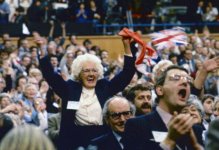

Whitelaw attacked previous governments for spending beyond the nation's means to earn revenue. This cheered some monetarists within his team. His party would make British firms globally competitive and improve economic growth. "That is why we had to make a change," he argued, embracing the record of a polarising, rather experimental administration in which he served as Deputy Prime Minister and Home Secretary. "You could always buy cheap popularity in politics; but what matters is, will it be right for the party? Much more important, will it be right for the country? In two or three years' time? Will we have done what is right for Britain? That's what matters." Nigel Lawson led a standing ovation, joined principally by Geoffrey Howe and Leon Brittan. Support from these men boosted Whitelaw's legitimacy by pulling other fiscal conservatives into the fold. His next segment intimated the unhappiness many had shared when unemployment, poverty and decline mushroomed out of control during their last spell in office. As Tories, every member needed to provide society with "the right way", instead of "easy answers". Reaffirming the concept behind his unity pitch for the leadership of "steadying the boat", Mr Whitelaw invited people from all sections of the party to design a compromise position on the economy, as well as other issues. Few proposed positions found favour from the militant wing. Conservatives on the front bench were making "excellent" progress, submitting ideas to: "unite the nation" with public and private investment; reconstruct industry using modern business practices; "support the most needy and vulnerable" using adequate welfare; reinvigorate the Keynesian promise by sticking to healthy finances with subsidies here and there; welcome immigration from the Commonwealth; promote European integration; and foster "peace and reconciliation in Ulster" by accepting the possibility of Irish reunification.

Here, the speech fell apart. Dozens of CWG and Monday Club figures, on hearing the leader's words, stormed out in protest. Whitelaw had failed to include ultra-conservative social traditionalists and free-market fundamentalists within the big tent. Electoral ruin blamed on monetarism and 'little England' isolation allowed - even, forced - shadow ministers to ditch Thatcherite economics, seeing no recourse but to adopt the liberal centrism of Francis Pym and Michael Heseltine. SDP president Ted Heath, once a close ally of Whitelaw's and now a bitter rival, gleefully told the BBC his former party was unravelling in a doomed effort to please everyone. The ex-PM had said of Paul Williams and the Monday Club: "I thoroughly disagree with his views. I always have and I suspect I always will. They are not the view of the modern Tory party, nor the views of the great majority of people in this country." Once he had wrapped up the address and conference ended, Mr Whitelaw re-shuffled his team to promote trusted associates. From the floor of the House of Commons, MPs watched 24 hard-right Conservatives renounce the party whip and sit as independents next to Enoch Powell, fellow Ulster Unionists and the DUP. These defectors were: Norman Tebbit, Tim Brinton, Ivan Lawrence, Nicholas Budgen, Tim Eggar, David Porter, John Moore, Barry Porter, Jill Knight, Rhodes Boyson, Peter Griffiths, Mark Lennox-Boyd, John Biggs-Davison, Anthony Berry, Nicholas Winterton, Marion Roe, John Townend, Bill Walker, John Wilkinson, George Gardiner, James Spicer, Peter Hordern, Carol Mather and William Clark. Mr Tebbit decried the party's "slide into socialism" as justification. Such dramatic events badly wrong-footed the Tory leadership and, most especially, broadcasters of the evening news who raised obvious comparisons with the SDP breakaway from Labour in 1981. The Conservative parliamentary bloc had lost a fifth of its members - a grave setback in anyone's book, spelling disaster for things to come.

Last edited:
The Official Unionists were drawn into the fray in early November, with some suggesting that they could mount a reverse takeover of the Conservatives. Having reluctantly disowned the Tories during the Falklands War crisis, OUP leader Jim Molyneaux was hesitant to now become head of a merged party. But he acknowledged that he was interested in his MPs and the Tories working very closely together. "I want to see Ulster Unionism at the heart of British politics. I don't see any justification for our being excluded from national politics, which in many respects we are." Events developed quickly, with Margaret Thatcher announcing that she would retire from the House of Commons at the next general election. Enoch Powell, described by now-SDP agriculture minister Jim Prior as working Molyneaux with his foot, rose to fill the vacuum on the back of secret talks with Norman Tebbit to establish a pan-unionist force. Sources told the press an historic realignment was discussed at the meeting. Now, figures from the CWG and Monday Club having abandoned the Tories, the question became live. Shortly after rearranging his team, Willie Whitelaw faced further embarrassment when the Marquess of Salisbury resigned as defence spokesman over policy on Ireland (replaced by Peter Emery), before sitting as an independent. Catholic Tories were appalled by the drama. Whitelaw's men briefed their approach: non-sectarianism, making the Assembly work and power-sharing with nationalists. Molyneaux stated that, following negotiation between Powell and Tebbit, his OUP and the 25 right-wing defectors would combine to form a new party, known as the Unionist Party of Great Britain and Northern Ireland.
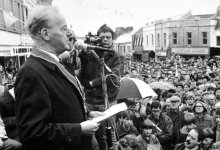
Speaking before dazzling lights and television cameras in Belfast, their grand realignment was launched on 12 November, in order to restore "traditional patriotic values" across the whole nation. The event also saw Keith Joseph, Cecil Parkinson and the fallen Iron Lady herself in attendance. Bodyguard protection and security were high. Mr Tebbit said Conservative governments had "many achievements" - wider home ownership, support for business and low taxation. "However, a failed consensus with Labour and now the Alliance has diminished the party and our country." He went on to stress the necessity of economic reform, starting with de-regulation of industry and massive privatisation of the nationalised bodies. The feline Enoch Powell rose next to Mr Tebbit, commanding journalists with his voice and stature. "Our new party will be different. We will speak to the forgotten people of this land," he boomed. Mr Powell criticised a "conspiracy of silence" between the other parties over growth through births of the immigrant population. He also vilified those who believed it was "too late to do anything" and that "there lies the certainty of violence on a scale which can only adequately be described as civil war". Jim Molyneaux, a traditional Orangeman, warned of an existential threat to the British state. "During my five years as leader of the Ulster Unionist Party, my objective has been to achieve for all the people of Northern Ireland those prizes of peace, stability and reconciliation. The vast majority of people must be free to make their contribution to the United Kingdom, just as we play our part."
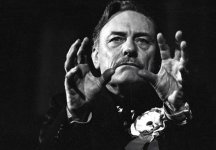

Speaking before dazzling lights and television cameras in Belfast, their grand realignment was launched on 12 November, in order to restore "traditional patriotic values" across the whole nation. The event also saw Keith Joseph, Cecil Parkinson and the fallen Iron Lady herself in attendance. Bodyguard protection and security were high. Mr Tebbit said Conservative governments had "many achievements" - wider home ownership, support for business and low taxation. "However, a failed consensus with Labour and now the Alliance has diminished the party and our country." He went on to stress the necessity of economic reform, starting with de-regulation of industry and massive privatisation of the nationalised bodies. The feline Enoch Powell rose next to Mr Tebbit, commanding journalists with his voice and stature. "Our new party will be different. We will speak to the forgotten people of this land," he boomed. Mr Powell criticised a "conspiracy of silence" between the other parties over growth through births of the immigrant population. He also vilified those who believed it was "too late to do anything" and that "there lies the certainty of violence on a scale which can only adequately be described as civil war". Jim Molyneaux, a traditional Orangeman, warned of an existential threat to the British state. "During my five years as leader of the Ulster Unionist Party, my objective has been to achieve for all the people of Northern Ireland those prizes of peace, stability and reconciliation. The vast majority of people must be free to make their contribution to the United Kingdom, just as we play our part."

Last edited:
Schism on the right unleashed a tidal wave at Westminster. As crisis engulfed the Conservative establishment ecosystem of politicians, news outlets and think tanks, the Unionist Party's birth triggered a mix of responses from the main parties. David Steel was the first to openly come out on the attack. "The truth is that a Tory rump dependent on Powellite sympathisers in their own midst is a greater threat to the unity of the UK than any band of nationalists." Shirley Williams pointed to a Eurosceptic threat from all directions - "Imagine the Bennites in Labour working with hard Unionists... it's just unthinkable." While the Alliance leadership produced a fundamentally centrist reflex against High Tory nationalism and free market zeal, other Liberal and SDP folk reacted with an equal understanding of the serious danger posed to newly won seats in the home counties and Midlands, where traditional social values and petit bourgeois resentment were strong. Enoch Powell had even built up a following throughout working-class communities, fearful of the mass immigration scorned in his 1968 'Rivers of Blood' speech.
Although he shared an opposition to European integration with most Unionist MPs, Tony Benn (more so than the likes of Denis Healey in his ranks) took seriously the perpetuation of racism by Powell and others. "He is a very powerful, right-wing force in society. He follows his beliefs and has clear objectives." Mr Benn sensed, despite an epic breakthrough for the Alliance in 1983, a gradual collapse of the post-war Attlee consensus. The remaining space would inevitably be occupied, handing power to either socialist reformers on the left or reactionaries and fascists on the right, committed to a brutal social Darwinism and privatisation. "So this idea that market forces have won the day is a complete illusion, spread by academics adhering to this new religion of monetarist fundamentalism... Nationalisation has got nothing whatever to do with socialism, which is all about democracy."
For his part, Willie Whitelaw started heavily consuming alcohol away from the press and colleagues. The assertion of parliamentary discipline fell to the whips; shadow ministers dealt with policy and tactics. Britain's once-mighty Conservative Party became ungovernable in the absence of credible leadership at the top tier. A Guardian opinion poll on 10 December delivered the opening public verdict on new developments. Leading with 40% came the Liberal/SDP Alliance. Next were Labour on 30%; the Conservatives scored 21%, with the Unionists at 8%. Interpretations were varied but Powell, who saw that his party's advance would mean a record slide in popularity for the Tories and great Unionist political dividends, hailed the poll. "I hope the electors supporting us realise how privileged they are to able to 'speak for Britain' before the rest of the country: they can help to turn out a government which persists in Europe in stripping this country of its right to make its own laws and policies and to levy its own taxes."

Although he shared an opposition to European integration with most Unionist MPs, Tony Benn (more so than the likes of Denis Healey in his ranks) took seriously the perpetuation of racism by Powell and others. "He is a very powerful, right-wing force in society. He follows his beliefs and has clear objectives." Mr Benn sensed, despite an epic breakthrough for the Alliance in 1983, a gradual collapse of the post-war Attlee consensus. The remaining space would inevitably be occupied, handing power to either socialist reformers on the left or reactionaries and fascists on the right, committed to a brutal social Darwinism and privatisation. "So this idea that market forces have won the day is a complete illusion, spread by academics adhering to this new religion of monetarist fundamentalism... Nationalisation has got nothing whatever to do with socialism, which is all about democracy."
For his part, Willie Whitelaw started heavily consuming alcohol away from the press and colleagues. The assertion of parliamentary discipline fell to the whips; shadow ministers dealt with policy and tactics. Britain's once-mighty Conservative Party became ungovernable in the absence of credible leadership at the top tier. A Guardian opinion poll on 10 December delivered the opening public verdict on new developments. Leading with 40% came the Liberal/SDP Alliance. Next were Labour on 30%; the Conservatives scored 21%, with the Unionists at 8%. Interpretations were varied but Powell, who saw that his party's advance would mean a record slide in popularity for the Tories and great Unionist political dividends, hailed the poll. "I hope the electors supporting us realise how privileged they are to able to 'speak for Britain' before the rest of the country: they can help to turn out a government which persists in Europe in stripping this country of its right to make its own laws and policies and to levy its own taxes."

Last edited:
As 1984 went by, a furore over the Militant Tendency and its status within Labour reached boiling point. Having Benn in the leadership ensured that Trotskyites and other revolutionary socialists might attain recognition as legitimate members of the party, despite 'entryist' activities such as promoting candidates to national and local government. Benn opposed the expulsions kick-started two years prior, while many of his allies (such as the young Jeremy Corbyn of Islington) organised to prevent a "witch hunt". The Labour conference in autumn ultimately revoked its endorsement of the Hayward-Hughes report. Hence, delegates voted to disband the register of non-affiliated groups. Militant was declared compatible with the party's constitution and permitted to operate inside Labour, on an equal footing with other factional bodies. Shadow Scottish secretary Tam Dalyell personally approved of this decision, alongside progressive followers of Benn and Michael Foot. An editorial in the September-October 1982 issue of New Socialist, Labour's internal magazine, had objected to the attacks against left-wing activists: "The expulsion of leading Militant supporters [is] wrong. The Labour Party always has been a broad collection that includes Marxists amongst its ranks. The Militant Tendency, drawing as it does upon Trotsky's critique of Stalinism, belongs to this Marxist tradition, and has a legitimate place within the Labour Party."
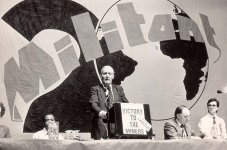
Deputy leader Neil Kinnock covertly and, in late 1984, explicitly rejected this viewpoint, in a damaging break with Mr Benn. At conference he turned on Militant. "I’ll tell you what happens with impossible promises. You start with far-fetched resolutions. They are then pickled into a rigid dogma, a code, and you go through the years sticking to that, outdated, misplaced, irrelevant to the real needs." As an initial storm of applause then morphed into a series of jeers from the floor, Militant activist Derek Hatton could be seen shouting "Liar!", as Shadow Chancellor Eric Heffer walked off the stage. It took over a minute for Kinnock to begin his second passage (after he rejected an offer from the Chair to intervene and call for calm): "I’m telling you, no matter how entertaining, how fulfilling to short term egos... I’ll tell you and you’ll listen... I’m telling you, you can’t play politics with people’s jobs and with people’s services." The future Labour MP Bryan Gould would later remark that conference then omitted a curious sound "as if it had been wounded". One delegate had to be restrained from launching themselves onto the stage in a fit of anger. Arthur Scargill, who'd addressed the crowd of passionate socialists with gusto and welcome the day before, began heckling together with Bennite and Militant supporters. Behind Kinnock on stage was Dennis Skinner, who looked on in stony silence as the Labour deputy leader took in a standing ovation. Benn regarded his speech as a snub to the grassroots left, a wide coalition that Mr Kinnock desired to separate between soft left 'modernisers' and hard left 'trots'. Relations among the pair at Labour's helm would deteriorate from here on in.
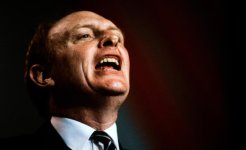

Deputy leader Neil Kinnock covertly and, in late 1984, explicitly rejected this viewpoint, in a damaging break with Mr Benn. At conference he turned on Militant. "I’ll tell you what happens with impossible promises. You start with far-fetched resolutions. They are then pickled into a rigid dogma, a code, and you go through the years sticking to that, outdated, misplaced, irrelevant to the real needs." As an initial storm of applause then morphed into a series of jeers from the floor, Militant activist Derek Hatton could be seen shouting "Liar!", as Shadow Chancellor Eric Heffer walked off the stage. It took over a minute for Kinnock to begin his second passage (after he rejected an offer from the Chair to intervene and call for calm): "I’m telling you, no matter how entertaining, how fulfilling to short term egos... I’ll tell you and you’ll listen... I’m telling you, you can’t play politics with people’s jobs and with people’s services." The future Labour MP Bryan Gould would later remark that conference then omitted a curious sound "as if it had been wounded". One delegate had to be restrained from launching themselves onto the stage in a fit of anger. Arthur Scargill, who'd addressed the crowd of passionate socialists with gusto and welcome the day before, began heckling together with Bennite and Militant supporters. Behind Kinnock on stage was Dennis Skinner, who looked on in stony silence as the Labour deputy leader took in a standing ovation. Benn regarded his speech as a snub to the grassroots left, a wide coalition that Mr Kinnock desired to separate between soft left 'modernisers' and hard left 'trots'. Relations among the pair at Labour's helm would deteriorate from here on in.

Last edited:
Disaffection with Willie Whitelaw became a factor causing droves of Conservative Party members to consider voting for the Unionist Party in future elections, according to academic reports and surveys over winter. The research found that while polices on immigration, Ulster and the EEC were significant issues for voters and Tory members in deciding allegiance, what caused them greater concern was the feeling that Mr Whitelaw did not share their values and appeared remote. Support for the Unionists jumped by more than half from 8% to 12% in January 1985 amid blanket media coverage of Enoch Powell and Norman Tebbit verbally eviscerating Alliance legislation and campaigning in urban seats. On his return to the limelight Mr Powell, backed by the far-right in Britain, also commanded popularity from working-class voters. Some had even gone on strike to voice approval for the Rivers of Blood speech in 1968, signing petitions and handing in tens of thousands of letters. The organiser of the strike, Harry Pearman, headed a delegation to meet Powell and said after: "I have just met Enoch Powell and it made me feel proud to be an Englishman. He told me that he felt that if this matter was swept under the rug he would lift the rug and do the same again. We are representatives of the working man. We are not racialists." Tebbit and people originally from the CWG and Monday Club groups appealed to disgruntled Conservative voters. The Unionist Party started to win over large numbers of former Tory activists with its right-wing, socially traditional message and hostility towards Whitelaw's agenda. Opposing the Government's joint sovereignty plan for Northern Ireland was a touchstone of dissent for rebellious Conservatives. The party soon haemorrhaged members, councillors, MPs and voters to the Unionists.
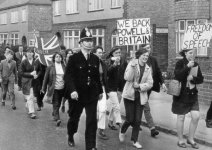
Power struggles behind the scenes of an often raucous House of Commons drew fresh attention. Not happy to keep Jim Molyneaux in charge, Tebbit announced to the press that he would challenge for the Unionist Party leadership shortly before Christmas 1984. He told the BBC, "I've spent many years of my life helping to build up this alternative to social democracy... I believe I can deliver the Unionist message... and lead the party from the front." Molyneaux had sought to move the focus of British politics towards Northern Ireland. One Unionist insider said the coming leadership election would be a pivotal moment: "Whether or not Jim stands, it is fair to say this will be a battle for the heart and soul of the party." Mr Tebbit said his main goal was to target voters in northern English seats. "My ambition is not insignificant: I want to replace the Labour Party and make us the patriotic voice of working people." On 17 December, he claimed in televised remarks that he did not think certain immigrant communities would assimilate "because some of them insist on sticking to their own culture, and they are extremely dangerous". Tebbit said the leadership pitch was necessary because Margaret Thatcher had been "run over by the proverbial bus" and he didn't "like the look" of her successors who would otherwise "destroy the work we've done". According to Thatcher's biographer John Campbell, in the previous Conservative race Tebbit was "her most visible cheerleader... who characteristically took the fight to Heseltine by holding a cheeky press conference on his Belgravia doorstep". Alongside his advocacy of sweeping privatisation and restrictions on migration to the UK, the former CWG head now attempted to outshine Molyneaux and the Powellites. The Royal Ulster Constabulary, argued Tebbit, was "the thin green line standing between bloody anarchy and the rule of law". His leadership would defend national independence and expose "the terrorists, bombers and extortionists" fighting for unification with Dublin.
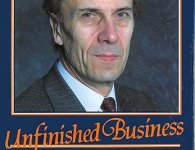
Mr Tebbit's supporters hoped that by launching the challenge, additional rivals would decline to step forward. It was not to be. A few days before MPs took their winter break, robust traditionalist Jill Knight told reporters she would run. In Parliament, she expressed reactionary views on social issues. Mrs Knight consistently opposed the legalisation of abortion - "Babies are not like bad teeth to be jerked out," she said during the passage of David Steel's abortion bill in 1967 - and also the provision of the contraceptive pill to teenagers. She opposed sanctions against the apartheid regime in South Africa and was a member of the Monday Club during its 70s heyday. It was in a speech at her constituency association's dinner in 1974 that Keith Joseph effectively ruined his chances of ever leading the Tory party by arguing that the balance of Britain's "human stock" was threatened because poorer people had too many children. However, Joseph and most Thatcherites in the nationwide Unionist grass roots opted for Tebbit's campaign, which emphasised free-market reforms and a less isolationist approach to issues such as NATO and Polaris. Facing a test to his authority from right-wing English colleagues, Molyneaux was both keen to retain his position and unite the party while stressing a tough line on the Ulster question. Only when Powell vowed to carry the torch did Molyneaux agree not to run in the election. He would stay in post until a candidate was chosen; with majority support from Northern Irish MPs, Mr Powell told journalists that he'd stand. His leadership would seek to: give representation to the body of Ulster Unionist opinion; campaign to repatriate immigrants; turn away from the US, Europe and nuclear weapons; put forward monetarist economic proposals; protect the civil liberties of white British nationals; and organise a vast base of "forgotten" people around this shared agenda.
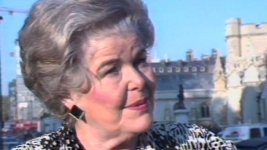

Power struggles behind the scenes of an often raucous House of Commons drew fresh attention. Not happy to keep Jim Molyneaux in charge, Tebbit announced to the press that he would challenge for the Unionist Party leadership shortly before Christmas 1984. He told the BBC, "I've spent many years of my life helping to build up this alternative to social democracy... I believe I can deliver the Unionist message... and lead the party from the front." Molyneaux had sought to move the focus of British politics towards Northern Ireland. One Unionist insider said the coming leadership election would be a pivotal moment: "Whether or not Jim stands, it is fair to say this will be a battle for the heart and soul of the party." Mr Tebbit said his main goal was to target voters in northern English seats. "My ambition is not insignificant: I want to replace the Labour Party and make us the patriotic voice of working people." On 17 December, he claimed in televised remarks that he did not think certain immigrant communities would assimilate "because some of them insist on sticking to their own culture, and they are extremely dangerous". Tebbit said the leadership pitch was necessary because Margaret Thatcher had been "run over by the proverbial bus" and he didn't "like the look" of her successors who would otherwise "destroy the work we've done". According to Thatcher's biographer John Campbell, in the previous Conservative race Tebbit was "her most visible cheerleader... who characteristically took the fight to Heseltine by holding a cheeky press conference on his Belgravia doorstep". Alongside his advocacy of sweeping privatisation and restrictions on migration to the UK, the former CWG head now attempted to outshine Molyneaux and the Powellites. The Royal Ulster Constabulary, argued Tebbit, was "the thin green line standing between bloody anarchy and the rule of law". His leadership would defend national independence and expose "the terrorists, bombers and extortionists" fighting for unification with Dublin.

Mr Tebbit's supporters hoped that by launching the challenge, additional rivals would decline to step forward. It was not to be. A few days before MPs took their winter break, robust traditionalist Jill Knight told reporters she would run. In Parliament, she expressed reactionary views on social issues. Mrs Knight consistently opposed the legalisation of abortion - "Babies are not like bad teeth to be jerked out," she said during the passage of David Steel's abortion bill in 1967 - and also the provision of the contraceptive pill to teenagers. She opposed sanctions against the apartheid regime in South Africa and was a member of the Monday Club during its 70s heyday. It was in a speech at her constituency association's dinner in 1974 that Keith Joseph effectively ruined his chances of ever leading the Tory party by arguing that the balance of Britain's "human stock" was threatened because poorer people had too many children. However, Joseph and most Thatcherites in the nationwide Unionist grass roots opted for Tebbit's campaign, which emphasised free-market reforms and a less isolationist approach to issues such as NATO and Polaris. Facing a test to his authority from right-wing English colleagues, Molyneaux was both keen to retain his position and unite the party while stressing a tough line on the Ulster question. Only when Powell vowed to carry the torch did Molyneaux agree not to run in the election. He would stay in post until a candidate was chosen; with majority support from Northern Irish MPs, Mr Powell told journalists that he'd stand. His leadership would seek to: give representation to the body of Ulster Unionist opinion; campaign to repatriate immigrants; turn away from the US, Europe and nuclear weapons; put forward monetarist economic proposals; protect the civil liberties of white British nationals; and organise a vast base of "forgotten" people around this shared agenda.

Last edited:
The SDP had been set up to replace, or at least challenge, the Labour Party as the principal party of the left in Britain. It appealed to the liberal-minded 'middle classes' and, overwhelmingly, to working-class voters alienated by Labour's radical socialism. Hence, the Alliance targeted large numbers of Labour-held seats. It carried strong appeal to former Conservative voters, too. Support picked up on deprived council estates, with even higher levels found in rural areas and comfortable suburbs. Planners at the top of the SDP observed that, if the most success would be attained by exploiting Tory unpopularity and division, the party ought to go after votes on the right rather than chasing the left. Foreign secretary David Owen suggested this change of strategy to his partners in the Gang of Four. Roy Jenkins was somewhat agreeable; both men were unconvinced by calls for expansive public ownership and state intervention, preferring a different direction with market-led reforms. David Steel and other high-ranking Liberals may have been willing to negotiate, yet Owen's bullish personality and attitude towards their party turned many off. Shirley Williams and Bill Rodgers maintained that the SDP and, more broadly (at least for now) the Alliance would strive to replace Tony Benn's increasingly "extreme" band of Militant activists, Scargill loyalists in the NUM and a quasi-revolutionary membership. While the Gang of Four possessed few dissimilarities over social policy and foreign affairs, the reorientation of Britain's economy caused some friction in the early months of 1985. The Chancellor assumed the mandate to renew and build upon Attlee's post-war consensus, instead of tearing it up. Rodgers envisaged quality public utilities, industrial democracy, high government spending and anti-poverty schemes to realise a "classless society". Jenkins and, especially, Owen also wanted to take the country in a more European social-market direction, where the line between a well-funded public sector and private business would be firmly established and the state would allow companies to flourish with light regulation. As very senior ministers in the leadership, Williams and Rodgers retained considerable influence over the SDP's political positioning; Owen increasingly looked to Heathites in the party to back his ideas, with the good relationships forged in the 1982 leadership election serving as a foundation. Given time, Steel would become embroiled in these periodic SDP arguments surrounding the precise destination of Alliance reform.

Britain entered 1985 with public opinion decisively in the Government's favour. Some of the next chapters will discuss how a surge for the right-wing Unionists impacted the Tories and quickly contributed to the fall of Willie Whitelaw's beleaguered project. At this stage, cooperation between the Gang of Four was relatively professional and ties between the Alliance parties also improved with first place in the polls and a series of legislative wins. Handsome, smooth, articulate and stubborn, Mr Steel enjoyed the popularity of many Liberal activists and voters for the breakthrough of 1983 and inroads at council level. By the turn of the year, a law close to his heart made its way on to the statute book: the Devolution Act, establishing a Scottish Parliament (plus a framework for decentralisation to Wales, subject to popular demand). Elections to the new body would be held in June 1985. A few notable politicians signalled their intent to leave for Holyrood - Donald Dewar (SDP) and Teddy Taylor (Unionist) being a couple of examples. For now, MPs were not obliged to resign from the Commons in order to stand for the Scottish Parliament. In addition, the Bill of Rights Act would "give further effect to rights and freedoms" guaranteed under the European Convention on Human Rights. The Freedom of Information Act made provision for the disclosure of information held by public authorities. By 1985 unemployment had reduced by 1 million, hitting the Alliance's bold target, while inflation came down to 4% in the context of a firm prices and wages mechanism. Steel and Williams celebrated their progress at an event in Manchester, talking up the positive impact on food costs, household incomes and tax receipts. GDP had increased by 7% compared to the start of 1983, amounting to a solid financial return on public works. The Single Benefit Act received royal assent in mid-December 1984, merging a number of key allowances and embedding a safety net for individuals and families. The Communities Act repealed immigration controls legislated for in the 1981 British Nationality Act, enshrining new protections against discrimination. Anti-migrant protests from supporters of the growing Unionist Party failed to change the outcome - between 1985 and 1997, Hong Kong-born ethnic Chinese would utilise their right of residency in the UK before the handover to Beijing. On re-nationalising exploration and production through the Oil and Gas (Modernisation) Act, the Government declared that reform of the British National Oil Corporation would develop along the lines set out by Eric Varley in the late 1970s - investing state-held revenues back into the sector to assist with energy security for decades to come. The Department of Industry began coordinating policy more effectively with the CBI and trade unions, following changes to organised labour and stronger business confidence to hire workers, linked to the results produced by the Alliance's economic miracle.
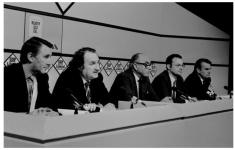

Britain entered 1985 with public opinion decisively in the Government's favour. Some of the next chapters will discuss how a surge for the right-wing Unionists impacted the Tories and quickly contributed to the fall of Willie Whitelaw's beleaguered project. At this stage, cooperation between the Gang of Four was relatively professional and ties between the Alliance parties also improved with first place in the polls and a series of legislative wins. Handsome, smooth, articulate and stubborn, Mr Steel enjoyed the popularity of many Liberal activists and voters for the breakthrough of 1983 and inroads at council level. By the turn of the year, a law close to his heart made its way on to the statute book: the Devolution Act, establishing a Scottish Parliament (plus a framework for decentralisation to Wales, subject to popular demand). Elections to the new body would be held in June 1985. A few notable politicians signalled their intent to leave for Holyrood - Donald Dewar (SDP) and Teddy Taylor (Unionist) being a couple of examples. For now, MPs were not obliged to resign from the Commons in order to stand for the Scottish Parliament. In addition, the Bill of Rights Act would "give further effect to rights and freedoms" guaranteed under the European Convention on Human Rights. The Freedom of Information Act made provision for the disclosure of information held by public authorities. By 1985 unemployment had reduced by 1 million, hitting the Alliance's bold target, while inflation came down to 4% in the context of a firm prices and wages mechanism. Steel and Williams celebrated their progress at an event in Manchester, talking up the positive impact on food costs, household incomes and tax receipts. GDP had increased by 7% compared to the start of 1983, amounting to a solid financial return on public works. The Single Benefit Act received royal assent in mid-December 1984, merging a number of key allowances and embedding a safety net for individuals and families. The Communities Act repealed immigration controls legislated for in the 1981 British Nationality Act, enshrining new protections against discrimination. Anti-migrant protests from supporters of the growing Unionist Party failed to change the outcome - between 1985 and 1997, Hong Kong-born ethnic Chinese would utilise their right of residency in the UK before the handover to Beijing. On re-nationalising exploration and production through the Oil and Gas (Modernisation) Act, the Government declared that reform of the British National Oil Corporation would develop along the lines set out by Eric Varley in the late 1970s - investing state-held revenues back into the sector to assist with energy security for decades to come. The Department of Industry began coordinating policy more effectively with the CBI and trade unions, following changes to organised labour and stronger business confidence to hire workers, linked to the results produced by the Alliance's economic miracle.

Last edited:
Action on the next round of Liberal/SDP bills for the Queen's Speech came in January 1985. David Steel took command of his approximately 40-seat working majority with a programme that promised "the necessary mixture of idealism and realism" to upgrade Britain in the name of economic efficiency and social justice. The determined tone was offset by a repeated commitment to speak and govern "for the whole nation." Mr Steel argued the Queen's Speech represented "the alliance of justice and progress too long absent from British politics." The modest seven-bill programme, formally unveiled by the Queen in familiar mid-morning ritual, contained no surprises or omissions that had not been heavily trailed by the Alliance communications team. This did not stop Tony Benn from damning it. "We have ministers who retained office under their present guise by abandoning socialism and distancing themselves from the trade union movement, adopting a European style of politics. Where they tinker around the edges of a rotten capitalist system, only Labour will confront the vested interests and stand up for our people." He singled out the Alliance's "flawed devolution package" as certain to damage Britain. One of the policy areas where Mr Benn promised support was in environmental protection. With Bill Rodger's third budget just weeks away, Mr Steel made it plain how central that was to the Alliance's hopes of reshaping society. "We have reached the limits of the public's willingness simply to accept pollution and degradation of our natural world," he warned MPs. "We are undertaking a thorough examination of all aspects of conservation and environmental policy." Willie Whitelaw joined Mr Benn in promising to uphold "constructive opposition", though he welcomed plans to codify police activities - a move that Benn said would upset the balance between the force's powers and civil liberties. The Prime Minister insisted the Government had "its feet on the ground and sound values in its heart" to deliver meaningful improvement.
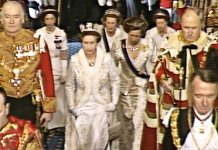
First among the proposed laws was a Nature Bill including: a ban on chlorofluorocarbons (CFCs) destroying the ozone layer, according to scientists; a carbon tax scheme; protection of natural life on land and in the oceans; and a wellbeing index. Second was the Criminal Evidence and Policing Bill, pioneered by Liberal Home Secretary Alan Beith to make further provision in relation to: the powers and duties of the police; those in detention; criminal evidence; police discipline; and complaints against the service. Third, a Railways Bill championed by SDP President Ted Heath outlined ground-breaking plans: modification of lines across Britain for a new service of high-speed rail with speeds of 125 mph (201 km/h); funding of a Channel Tunnel bridging the UK and France, in addition to the North Sea gas pipeline and full electrification of the railways; and new investment linked to rationalised employment practices - a move which prompted fierce criticism from the unions. Fourth, a Welsh Referendum Bill made legal provision for the holding of a non-binding public vote in Wales on the establishment of a democratically elected Assembly. Fifth, Roy Hattersley spearheaded an Examinations Bill. This was the final product of work by Shirley Williams and him to merge CSEs and O-Levels into a national qualification for those who decided to leave school at 16 and pursue training or a job, rather than A-Levels. Sixth, an Urban Development Bill covered reforms to planning law, making it easier to: build social and privately-owned homes; devise a central government blueprint for new towns; and support local councils to fund key infrastructure with public consent. Finally, an Equalities Bill introduced positive action to remove barriers and obstacles faced by people from minority groups in employment. Steel and Williams used this Queen's Speech agenda to dismiss opponents as nostalgic and conservative. Yet they also invoked the narrative of an historic "progressive alliance" between social democracy and new liberalism as a means of presenting themselves as the guardians of an older and therefore seemingly more authentic tradition within Labour's history. For most of the SDP's founders, this was a crucial way of maintaining a sense of personal and political continuity, of demonstrating that they remained loyal to the spirit and traditions of the party they had abandoned.
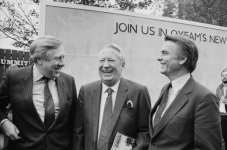

First among the proposed laws was a Nature Bill including: a ban on chlorofluorocarbons (CFCs) destroying the ozone layer, according to scientists; a carbon tax scheme; protection of natural life on land and in the oceans; and a wellbeing index. Second was the Criminal Evidence and Policing Bill, pioneered by Liberal Home Secretary Alan Beith to make further provision in relation to: the powers and duties of the police; those in detention; criminal evidence; police discipline; and complaints against the service. Third, a Railways Bill championed by SDP President Ted Heath outlined ground-breaking plans: modification of lines across Britain for a new service of high-speed rail with speeds of 125 mph (201 km/h); funding of a Channel Tunnel bridging the UK and France, in addition to the North Sea gas pipeline and full electrification of the railways; and new investment linked to rationalised employment practices - a move which prompted fierce criticism from the unions. Fourth, a Welsh Referendum Bill made legal provision for the holding of a non-binding public vote in Wales on the establishment of a democratically elected Assembly. Fifth, Roy Hattersley spearheaded an Examinations Bill. This was the final product of work by Shirley Williams and him to merge CSEs and O-Levels into a national qualification for those who decided to leave school at 16 and pursue training or a job, rather than A-Levels. Sixth, an Urban Development Bill covered reforms to planning law, making it easier to: build social and privately-owned homes; devise a central government blueprint for new towns; and support local councils to fund key infrastructure with public consent. Finally, an Equalities Bill introduced positive action to remove barriers and obstacles faced by people from minority groups in employment. Steel and Williams used this Queen's Speech agenda to dismiss opponents as nostalgic and conservative. Yet they also invoked the narrative of an historic "progressive alliance" between social democracy and new liberalism as a means of presenting themselves as the guardians of an older and therefore seemingly more authentic tradition within Labour's history. For most of the SDP's founders, this was a crucial way of maintaining a sense of personal and political continuity, of demonstrating that they remained loyal to the spirit and traditions of the party they had abandoned.

Last edited:
The Chancellor, Bill Rodgers, offered a helping hand to the working poor while reassuring middle earners on 19 February 1985 when the Alliance's third budget heralded radical reform of industry and a concerted attack on poverty. Standing outside No. 11 Downing Street brandishing his red box, Mr Rodgers departed for the House of Commons to proclaim "an era of social reform". The Government, he said, was "deeply concerned with the welfare of our people" and "unequivocally on the centre left". Despite a shake-up of the tax and benefits system based on an American-style tax break for those on low incomes, the Chancellor's budget carefully avoided measures that would have jeopardised the electoral coalition pieced together by David Steel and Shirley Williams in their victory two years ago. In a clear bid to position the Alliance as pro-business, Rodgers pushed through a previously flagged credit scheme to subsidise modernising projects at low interest, removed regulations on most competitive nationalised bodies and offered tax breaks for private research and development. "My message to business is this: when you are ready to start out, start up, start investing or start hiring - this government is on your side." His tough but tender approach was reinforced by some extra money for the Government's priority areas for higher public spending: education, health and public transport, financed by an underspend in other areas. The Alliance's determination to hang on to its support in rural areas was highlighted with an exemption for agricultural land from the Land Value Tax introduced back in 1983. Mr Rodgers also said he would raise the upper limit at which National Insurance contributions are paid to £315 per week. The Chancellor sought to put flesh on the bones of the Prime Minister's call for the Alliance to occupy the radical centre of British politics with a programme to build a national economic consensus. A flagship initiative of Educational Maintenance Allowances (EMAs) would pay students to finance living costs and essential items such as books, building on successful investment in the lives of young people. Mr Rodgers saved the most ambitious plans for last. He said the UK needed to improve its productivity, lower its energy costs, build more housing, start a new industrial strategy and help regional cities. The Chancellor said his budget would put employee representatives on company boards. "European nations with better worker participation tend to have higher investment, higher employment rates and lower levels of inequality and poverty." He told MPs that because prosperity needed to come from the bottom up, the budget would establish one-stop Regional Development Agencies to co-ordinate economic planning, help small business and encourage inward investment.
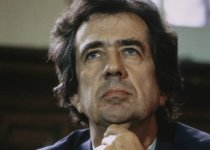
Tony Benn denounced the budget as a "step-by-step betrayal" of left-wing election pledges that would not sufficiently protect jobs and close the inequality gap. Although he said he would be delighted if the Government wished to steal parts of the Labour manifesto by giving employees more say in their companies, Mr Benn argued the Chancellor had failed to transform the economy in the interests of "working people and their families". The Leader of the Opposition issued a call to join the fight against a "government of the very wealthy". Under-investment would "wreck the lives of millions by devastating our jobs, pay, pensions, NHS, education, transport, postal and other services", he predicted. "We resolve to campaign for a radical alternative, with the level of determination shown by trade unionists and social movements in other countries." Benn laid out his party's alternative budget, devised together with Shadow Chancellor Eric Heffer. It would "place the banks under democratic control and raise revenue by increasing tax for the rich, plugging tax loopholes, withdrawing troops from Ireland, abolishing the nuclear 'deterrent' by cancelling Polaris." Michael Heseltine dubbed Mr Rodgers a "pick-pocket chancellor". As he rose to give the Tory response, a few MPs from the Unionist Party heckled before the Speaker demanded quiet. "We already know that this is a government that says one thing and does another, that takes a pound and gives a few pennies back," asserted Mr Heseltine. "The truth, after three budgets, is that the total of taxation is still rising and the Chancellor did not have the guts in his speech to say so." He described it as "astonishing" that Rodgers had found the money to lavish on public services but had not committed to reduce income or corporation taxes. Peter Hordern made a series of proposals to differentiate his party from its rivals. A Unionist government would: "pursue financial stability and free enterprise"; cut state spending to 1980 levels with the loss of two million public sector jobs replaced by manufacturing employment; de-nationalise British Telecom and other assets; replace "foreigners employed in industries" by unemployed Britons; freeze immigration; raise defence spending to 6% of GDP; abolish wages councils; go faster on trade union reform against threats of industrial action; end the moratorium on building nuclear power stations; and slash the UK's "wasteful" overseas aid fund.
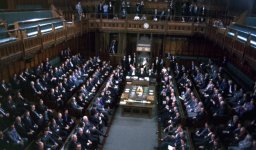

Tony Benn denounced the budget as a "step-by-step betrayal" of left-wing election pledges that would not sufficiently protect jobs and close the inequality gap. Although he said he would be delighted if the Government wished to steal parts of the Labour manifesto by giving employees more say in their companies, Mr Benn argued the Chancellor had failed to transform the economy in the interests of "working people and their families". The Leader of the Opposition issued a call to join the fight against a "government of the very wealthy". Under-investment would "wreck the lives of millions by devastating our jobs, pay, pensions, NHS, education, transport, postal and other services", he predicted. "We resolve to campaign for a radical alternative, with the level of determination shown by trade unionists and social movements in other countries." Benn laid out his party's alternative budget, devised together with Shadow Chancellor Eric Heffer. It would "place the banks under democratic control and raise revenue by increasing tax for the rich, plugging tax loopholes, withdrawing troops from Ireland, abolishing the nuclear 'deterrent' by cancelling Polaris." Michael Heseltine dubbed Mr Rodgers a "pick-pocket chancellor". As he rose to give the Tory response, a few MPs from the Unionist Party heckled before the Speaker demanded quiet. "We already know that this is a government that says one thing and does another, that takes a pound and gives a few pennies back," asserted Mr Heseltine. "The truth, after three budgets, is that the total of taxation is still rising and the Chancellor did not have the guts in his speech to say so." He described it as "astonishing" that Rodgers had found the money to lavish on public services but had not committed to reduce income or corporation taxes. Peter Hordern made a series of proposals to differentiate his party from its rivals. A Unionist government would: "pursue financial stability and free enterprise"; cut state spending to 1980 levels with the loss of two million public sector jobs replaced by manufacturing employment; de-nationalise British Telecom and other assets; replace "foreigners employed in industries" by unemployed Britons; freeze immigration; raise defence spending to 6% of GDP; abolish wages councils; go faster on trade union reform against threats of industrial action; end the moratorium on building nuclear power stations; and slash the UK's "wasteful" overseas aid fund.

Last edited:
The Unionists might have rocked the political world in defying the Government with a hard-line policy on Northern Ireland and defections from the Conservatives in Parliament, but the party was now bitterly divided. After Norman Tebbit's statement of intent to challenge Jim Molyneaux for the leadership, the contest to decide his successor threatened to destroy the insurgent group of Powellites, Thatcherites, Orangemen and social reactionaries. While a handful of candidates jockeyed to replace Molyneaux, three were particularly significant. The first was Enoch Powell, a controversial Birmingham-raised maverick of Welsh descent who behind the scenes had support from Molyneaux and his confidantes. Mr Powell was best known for his 'Rivers of Blood' speech warning of the dangers of mass immigration, a deep conviction against Irish unification and years of bad blood with former Conservative PM Ted Heath. Nativists in the membership adored him in their thousands. A minority appreciated his relative liberalism on several social issues including capital punishment. Should Powell win he might be tempted to appoint Mr Molyneaux as deputy to simultaneously hold on to Ulster loyalists. His strength was reflected in the fact that many bookies saw him as the favourite. Multiple senior activists told journalists that if Powell were excluded from running for the leadership, they would switch to a third candidate in order to stop what they saw as a takeover of the Unionists by the Thatcherite wing.

Second was Norman Tebbit, representing the CWG-aligned populists, an experienced candidate who was best known for successfully introducing harsh anti-union legislation, overseeing record unemployment as part of the previous ministry and battling Willie Whitelaw and Michael Heseltine in the 1983 Tory leadership race. Inside the Unionist Party Tebbit was also the candidate who talked the loudest about wanting to double down on Labour territory. He believed that they should be benefiting far more from the radical leftism of Tony Benn and Labour's "utter failure" to talk to working-class voters in a language that they understood. Polling in third was Jill Knight, who claimed unionists were "more relevant that we have ever been" following the New Ireland Forum report. "Under my leadership, our party will keep the pressure on law-makers to ensure that no concessions are made on the national integrity of the United Kingdom. I think what we have to show the electorate now is we have got a fantastic set of ideas and our job now is to build on those policies, get more councillors elected and place us on to a war footing." Mrs Knight was respected within the Unionist Party, liked by most activists and could be a leader who would genuinely connect in the southern Conservative shires.

Whoever won, it was difficult to see how the new leader would bring unity to the party. Should Powell or Knight emerge victorious, then it was likely that the anti-Tebbit factions would step up their efforts to silence their critics once and for all. If Mr Tebbit were to triumph, pundits expected unrest while Margaret Thatcher (still a Conservative MP) and her followers would get a back-seat driving role as part of an operation to detoxify and expand upon the monetarist policies attempted last time in office. Beyond the current crisis was there room for the Unionist Party in 1980s Britain? There was certainly space. Labour's disarray since Michael Foot and the rise of the Alliance had sharpened the appetite for a right-wing insurgency. Then there were the forthcoming local elections in 1985 that offered the Unionists a chance to inflict damage on Labour and sustain pressure on the Conservatives. Potential existed to gain ground in the first Scottish Parliament election, where in June what Tebbit nicknamed "the National Party" could break into Labour heartlands. Under normal circumstances they might have been expected to gear up to exploit these openings. But neither Molyneaux nor his party had so far proved able to resolve the tensions and personality disputes bubbling under the surface since Powell's 1974 move from Wolverhampton to South Down and the Official Unionists' betrayal of Thatcher in the confidence vote of November 1982.
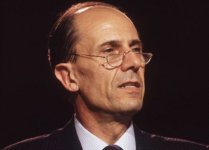
Rev. Martin Smyth, the MP for South Belfast, ended weeks of speculation when he declared that he would mount a leadership challenge. Diehard unionists were angered when Mr Tebbit suggested that he would be prepared to negotiate on very limited concessions with Éire - ahead of IRA disarmament - provided Sinn Féin offered cast-iron guarantees about de-commissioning their weapons and respecting British sovereignty. Mr Smyth, an opponent of Anglo-Irish talks, made it clear that he would abandon the process when he said yesterday that he would offer a "more vigorous promotion of Unionist policy". While a close ally of Molyneaux during his five-year leadership in Northern Ireland, Smyth (previously head of the Orange Order and holding a folksy appeal to its working-class base) wanted "Ulster Unionism" at the heart of British politics with an authentic voice from the province as leader. He won early support from many in the Ulster Unionist Council, which hitherto had sent numerous delegates to vote at each leadership election. The 1985 ballot was currently restricted to MPs, which infuriated the grass roots.
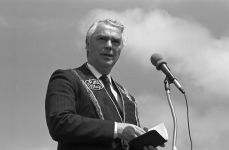

Second was Norman Tebbit, representing the CWG-aligned populists, an experienced candidate who was best known for successfully introducing harsh anti-union legislation, overseeing record unemployment as part of the previous ministry and battling Willie Whitelaw and Michael Heseltine in the 1983 Tory leadership race. Inside the Unionist Party Tebbit was also the candidate who talked the loudest about wanting to double down on Labour territory. He believed that they should be benefiting far more from the radical leftism of Tony Benn and Labour's "utter failure" to talk to working-class voters in a language that they understood. Polling in third was Jill Knight, who claimed unionists were "more relevant that we have ever been" following the New Ireland Forum report. "Under my leadership, our party will keep the pressure on law-makers to ensure that no concessions are made on the national integrity of the United Kingdom. I think what we have to show the electorate now is we have got a fantastic set of ideas and our job now is to build on those policies, get more councillors elected and place us on to a war footing." Mrs Knight was respected within the Unionist Party, liked by most activists and could be a leader who would genuinely connect in the southern Conservative shires.

Whoever won, it was difficult to see how the new leader would bring unity to the party. Should Powell or Knight emerge victorious, then it was likely that the anti-Tebbit factions would step up their efforts to silence their critics once and for all. If Mr Tebbit were to triumph, pundits expected unrest while Margaret Thatcher (still a Conservative MP) and her followers would get a back-seat driving role as part of an operation to detoxify and expand upon the monetarist policies attempted last time in office. Beyond the current crisis was there room for the Unionist Party in 1980s Britain? There was certainly space. Labour's disarray since Michael Foot and the rise of the Alliance had sharpened the appetite for a right-wing insurgency. Then there were the forthcoming local elections in 1985 that offered the Unionists a chance to inflict damage on Labour and sustain pressure on the Conservatives. Potential existed to gain ground in the first Scottish Parliament election, where in June what Tebbit nicknamed "the National Party" could break into Labour heartlands. Under normal circumstances they might have been expected to gear up to exploit these openings. But neither Molyneaux nor his party had so far proved able to resolve the tensions and personality disputes bubbling under the surface since Powell's 1974 move from Wolverhampton to South Down and the Official Unionists' betrayal of Thatcher in the confidence vote of November 1982.

Rev. Martin Smyth, the MP for South Belfast, ended weeks of speculation when he declared that he would mount a leadership challenge. Diehard unionists were angered when Mr Tebbit suggested that he would be prepared to negotiate on very limited concessions with Éire - ahead of IRA disarmament - provided Sinn Féin offered cast-iron guarantees about de-commissioning their weapons and respecting British sovereignty. Mr Smyth, an opponent of Anglo-Irish talks, made it clear that he would abandon the process when he said yesterday that he would offer a "more vigorous promotion of Unionist policy". While a close ally of Molyneaux during his five-year leadership in Northern Ireland, Smyth (previously head of the Orange Order and holding a folksy appeal to its working-class base) wanted "Ulster Unionism" at the heart of British politics with an authentic voice from the province as leader. He won early support from many in the Ulster Unionist Council, which hitherto had sent numerous delegates to vote at each leadership election. The 1985 ballot was currently restricted to MPs, which infuriated the grass roots.

Last edited:
Enoch Powell took the fight to Norman Tebbit on 7 January 1985. With assistance from Jill Knight, the front-runner unleashed an attack on Tebbit's record in government and policy acumen. Mr Powell had built a nativist, right-libertarian and British unionist coalition with anti-EEC and anti-US overtones quite different from the populist movement of discontented Thatcher voters her former Employment Secretary relied on. As Mr Tebbit said onstage: "We are building a national party. Many new people are coming in." But during events and interviews on the campaign trail, his rivals tried to discredit him with those voters and consolidate their own appeal among Unionists who disdained Tebbit. Powell used immigration as a cudgel. One question at a party hustings in Birmingham, Mrs Knight's home turf, concerned Mr Tebbit's plan to deport all undocumented immigrants but to let "the good ones" back in. Knight seized the opportunity. "The truth is, I'm afraid, that a lot of these positions that he’s now taking are new to him," she said. Mr Powell attacked Tebbit as a late convert. "I really find it amazing that my opponent believes that he is the one who discovered the issue of illegal immigration. I can tell you, when I was responsible for looking at housing policy in government, I resolved to lead the fight against amnesty: to repatriate every non-white immigrant from our society on behalf of the indigenous people." Powell also repeatedly hit Tebbit on economic literacy, contrasting their ministerial records and experience. In response came a defence of the Thatcher legacy by her former lieutenant: "By the end of our term growth had returned, strikes disappeared and prices fell. We gave tenants of municipal properties the right to buy their homes and acquire capital to leave to their children. I would build upon this inheritance."
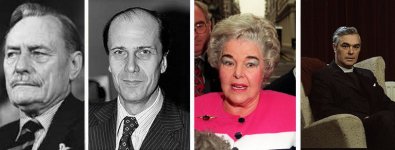
Mr Powell privately feared that his two main rivals could abandon the unionist cause of keeping Northern Ireland tied to Great Britain. He'd pragmatically allied with Mrs Knight to go after Mr Tebbit with accusations that he was weak on Europe, migration, unemployment, devolution, defence and America. This challenge to Tebbit on 'repatriation' (i.e. deportation) hurt his standing among ultra-conservative members. Eager to prevent his Ulster Unionist friends from defecting to the Martin Smyth campaign, Powell called him out for supporting a federal UK with home rule for Northern Ireland. "We are not devolutionists. The honourable reverend is perfectly entitled to his views, but they are not the views of my good friend James Molyneaux, I or many British unionists across these islands." On 2 February in County Antrim, addressing a crowd of factory workers waving 'Enoch for PM' signs, their charismatic hero spoke in favour of a pact with the loyalist Democratic Unionist Party enduring through to the next general election. Knight refused to endorse this position, her dismissive comments indicating a level of High Tory snobbery towards their voters. Powell seized on this by creating a wedge issue to court grass-roots Monday Club branches. Mr Tebbit agreed to renew an electoral pact with the DUP. Smyth appealed to moderate unionists with his federal devolution plan and liberal social views, although he went to great pains to assure the party of his opposition to the Alliance Government's decision to explore British-Irish joint sovereignty over Northern Ireland.
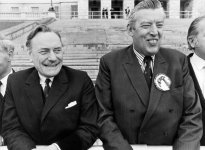

Mr Powell privately feared that his two main rivals could abandon the unionist cause of keeping Northern Ireland tied to Great Britain. He'd pragmatically allied with Mrs Knight to go after Mr Tebbit with accusations that he was weak on Europe, migration, unemployment, devolution, defence and America. This challenge to Tebbit on 'repatriation' (i.e. deportation) hurt his standing among ultra-conservative members. Eager to prevent his Ulster Unionist friends from defecting to the Martin Smyth campaign, Powell called him out for supporting a federal UK with home rule for Northern Ireland. "We are not devolutionists. The honourable reverend is perfectly entitled to his views, but they are not the views of my good friend James Molyneaux, I or many British unionists across these islands." On 2 February in County Antrim, addressing a crowd of factory workers waving 'Enoch for PM' signs, their charismatic hero spoke in favour of a pact with the loyalist Democratic Unionist Party enduring through to the next general election. Knight refused to endorse this position, her dismissive comments indicating a level of High Tory snobbery towards their voters. Powell seized on this by creating a wedge issue to court grass-roots Monday Club branches. Mr Tebbit agreed to renew an electoral pact with the DUP. Smyth appealed to moderate unionists with his federal devolution plan and liberal social views, although he went to great pains to assure the party of his opposition to the Alliance Government's decision to explore British-Irish joint sovereignty over Northern Ireland.

Last edited:

